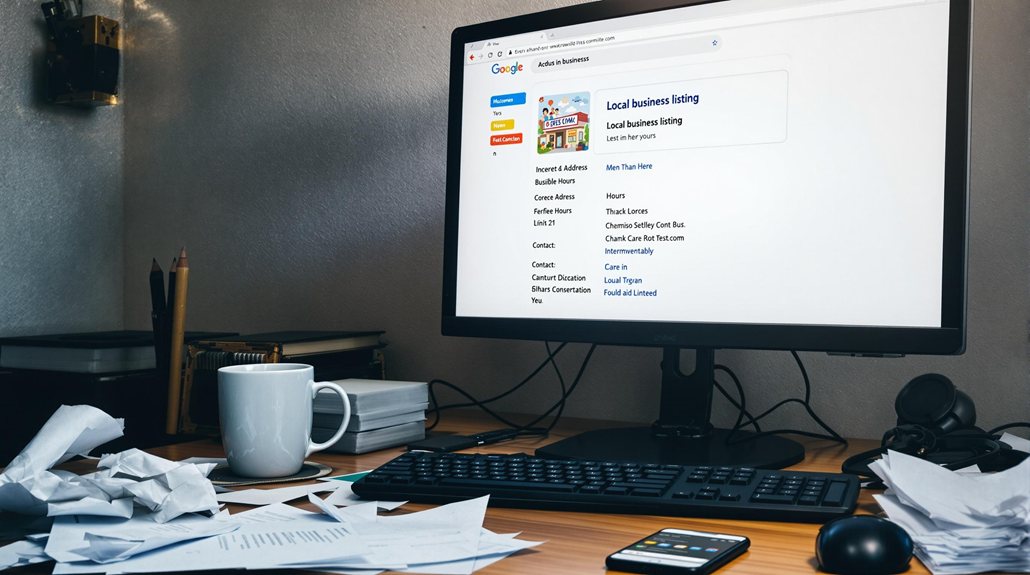As a local business, you can't afford to make common content writing mistakes that sabotage your local SEO efforts. Inaccurate business information, failure to verify your Google profile, incomplete profiles, and inconsistent NAP details across platforms can all hurt your visibility and credibility. Not updating content regularly or targeting the right local keywords also limits your reach. Avoid these pitfalls, and you'll be on your way to standing out in local search. Continue reading to discover more local SEO content best practices.
Inaccurate Local Business Information

According to the data, 68% of consumers would stop using a local business if they found incorrect information about it online. This underscores the critical importance of maintaining accurate local business information. In fact, 93% of consumers report frustration with incorrect information in online directories, while 80% lose trust in businesses due to inaccurate or inconsistent contact details. To make matters worse, 71% of consumers have had negative experiences because of incorrect business information, and 30% might switch to competitors if they can't find a business due to wrong details. Consumers over 55 and women are more likely to call for help when faced with incorrect information. Clearly, inaccurate local business information can severely damage a company's reputation and bottom line.
Failure to Verify Google Business Profile Listings

If you're not verifying your Google Business Profile, you're missing out on a significant opportunity to enhance your local visibility and credibility. Verified profiles enjoy:
- Enhanced visibility in Google Search and Maps
- A credibility boost that builds customer trust
- Full control over your business information
- Increased local SEO performance through higher search rankings.
Incomplete Profile Details

Your online presence is crucial for attracting local customers. However, if your business profiles lack key details, you're missing out on opportunities to build trust and improve search visibility. 46% of Google searches are for local businesses. Ensure your profiles include accurate NAP, business hours, services, photos, and other relevant information to establish credibility and enhance your local SEO.
Missing Business Information
One of the most common issues businesses face with local SEO is missing or incomplete profile details. This can significantly harm your search visibility and damage consumer trust. Some key problems include:
- Inconsistent NAP: Inconsistencies in your business name, address, and phone number across platforms can hurt your search ranking.
- Incomplete Information: Failing to fill out all fields in your Google Business Profile can reduce clicks and engagement.
- Outdated Details: Not regularly updating your business hours, services, and other attributes can lead to inaccurate information.
- Incomplete profile details can also negatively impact your local search rankings].
Addressing these gaps is crucial for improving local SEO performance and providing a positive user experience. Consistent, comprehensive, and up-to-date profile details are essential for maximizing your online presence.
Neglected Verification Process
Although Google My Business (GMB) verification is a crucial step in local SEO, many businesses often neglect this essential process. Verified listings are more likely to appear in the Local Pack, Maps, and Local Finder results. Verification authenticates your business presence and builds trust with potential customers. Unverified listings are less likely to appear in the local pack or maps, missing key opportunities for visibility. This oversight can put you at a competitive disadvantage, as verified businesses enjoy enhanced credibility and higher local search rankings. Additionally, consistent and complete profile details across GMB and other directories are vital for maintaining your online reputation. Overlooking this foundational step can significantly impact your local SEO strategy and overall online presence.
Incomplete Service Details
Incomplete service details can significantly impact your local SEO strategy. Incomplete profiles may reduce your business visibility in search results, erode customer trust, and lead to substantial sales losses.
The effects are far-reaching:
- Inaccurate details can lower your search rankings, hindering your reach and conversions.
- Incomplete information may result in missed opportunities from "near me" searches, especially on mobile.
- Inconsistent data across directories can undermine your credibility and reputation.
- 92% of local SEO and marketing professionals claim to have experimented with ChatGPT, which could further impact incomplete service details if not properly optimized.
Promptly correcting incomplete details is crucial to maintaining consumer trust and maximizing your local SEO success. Prioritize accurate, verified information to enhance your online presence and drive more customers to your door.
Inconsistent NAP Across Online Platforms
Consistent and accurate Name, Address, and Phone number (NAP) information across online platforms is paramount for local SEO success. Consistent NAP details enhance a business's credibility and improve its chances of appearing in local search results. Inconsistent NAP confuses search engines, casting doubt on your business's legitimacy and reducing your visibility in local search results. Correct NAP details are a top local ranking factor, and uniform information across directories enhances your credibility and customer trust. Inconsistencies, however, can dilute your link equity and negatively impact your online presence. Regularly audit your NAP and correct any discrepancies to ensure your business stands out in local search.
| Impact on Search Engine Credibility |
Effects on Local Search Rankings |
Consequences on Customer Experience |
|---|---|---|
| Confuses search engines | Vital for high rankings | Frustrates users |
| Lowers business visibility | Leads to lower rankings | Directs to wrong info |
| Signals untrustworthiness | Increases search appearance | Reduces satisfaction |
Neglecting Profile Updates
Neglecting to update your Google My Business profile regularly can severely impact your local visibility and search rankings. Investing in Google My Business profile optimization is a must to rank higher in local Google search results. Failing to post fresh content, share behind-the-scenes stories, and incorporate relevant keywords and visuals can lead to decreased engagement and authority with your customers. To maintain an active and authoritative online presence, it's crucial to prioritize consistent profile updates that showcase your business's unique offerings and connect with your local audience.
Maintaining Accurate Listings
While maintaining up-to-date and accurate Google Business Profiles is crucial for local SEO success, many businesses often overlook the importance of regular profile updates. Neglecting to update your listing can lead to:
- Declining local search rankings as Google prioritizes active, informative profiles.
- Outdated information that erodes customer trust and negatively impacts the user experience.
- Missed opportunities to showcase your business, share success stories, and engage with your audience.
- A loss of credibility and a competitive edge within the local market.
Consistent NAP Information
Maintaining accurate and consistent NAP (Name, Address, Phone number) information across all online listings is paramount for your local SEO success. Inconsistencies can confuse search engines, leading them to view your business as unreliable. Consistent NAP helps align your details across directories, enhancing your visibility and credibility. Neglecting NAP consistency opens the door to missed opportunities and a loss of potential customers. Inaccurate listings make you appear less trustworthy, frustrating customers and reducing your online presence. Use tools like Moz Local and Google My Business to manage and track your NAP, ensuring you maintain a professional, reliable image across all platforms.
Lack of Location-Specific Keywords
One of the most common mistakes businesses make when it comes to local SEO content writing is the lack of location-specific keywords. This oversight can severely impact your visibility in local search results, attracting less relevant traffic and putting you at a competitive disadvantage. Without these localized terms, you miss out on opportunities to engage with your community and target your intended audience effectively. To avoid this pitfall, ensure you:
- Conduct thorough local keyword research
- Integrate location-specific keywords naturally across your content
- Regularly update your content to stay relevant with changing local trends
Addressing this issue can significantly improve your local SEO performance and help you stand out in your community.
Ignoring Keyword Research Tools
Another common mistake businesses make in local SEO content writing is ignoring keyword research tools. Tools like Google Keyword Planner and Ahrefs can help identify high-value local keywords, while Semrush and Moz analyze search intent and competition. Failing to use these tools can lead to irrelevant keywords that don't resonate with your local audience. Regular updates to these tools also enhance their effectiveness, so it's crucial to utilize multiple tools to ensure a comprehensive keyword strategy. By overlooking the insights these tools provide, you miss out on opportunities to rank higher in local search and attract the right customers.
Overuse of Generic Keywords
While local SEO revolves around tailoring content for your specific geographic market, you may inadvertently undermine this strategy by overusing generic keywords. This common mistake stems from a lack of understanding local search intent, leading to low conversion rates and competitive search environments. The key issues include:
- Lack of geographic relevance
- Higher competition
- Missed conversion opportunities
To avoid these pitfalls, focus on incorporating location-specific terms, leveraging long-tail keywords, and aligning your content strategy with local SEO goals. Regular keyword audits and optimizing for semantic search can further improve your content's effectiveness in reaching your target audience.
Missing Long-Tail Keywords
Failing to incorporate location-specific long-tail keywords into your content can severely limit your local SEO visibility. These targeted phrases allow you to connect with hyper-relevant users searching for your products or services. Don't miss out on the opportunity to leverage long-tail keyword variations to boost your local search rankings and conversion rates.
Targeting Location-Specific Phrases
Targeting location-specific phrases is crucial for your local SEO strategy, as they help search engines understand the relevance of your content to specific geographic areas. However, common mistakes in this area can hinder your visibility and lead to a competitive disadvantage. For instance, overlooking local intent, limited geographic reach, and insufficient keyword research can all impact your rankings. Additionally, poor on-page optimization and inconsistent use of location terms can confuse search engines. To avoid these pitfalls, focus on:
- Developing geo-specific content
- Utilizing Google My Business
- Capturing long-tail local phrases
- Analyzing local search trends
- Segmenting your audience
Leveraging Long-Tail Variations
Overlooking the power of long-tail keywords can significantly limit your local SEO efforts. These specific, multi-word phrases target niche audiences and reduce competition, driving higher conversion rates and better SERP positions. Yet, many businesses fail to leverage this tactic, neglecting to use keyword research tools or integrate long-tail keywords consistently throughout their content. Analyzing user feedback, reviewing website analytics, and incorporating long-tail phrases into LinkedIn profiles can uncover valuable insights. Embracing long-tail keywords supports the creation of highly relevant and personalized content, enhancing your local authority and signaling quality to search engines. Don't miss out on this powerful SEO strategy.
Overlooking "Near Me" Search Phrases
Although it may be tempting to overlook the significance of "near me" search phrases in your local SEO strategy, doing so can result in missed opportunities to connect with your target audience. These phrases are crucial for:
- Improving local authority and relevance
- Targeting high-intent, long-tail keywords
- Optimizing for voice search and mobile users
Neglecting local search intent can lead to a lack of geographic targeting, reduced content relevance, and a failure to capitalize on competitive advantages. To ensure your local SEO content writing is effective, be sure to integrate "near me" phrases naturally, leverage schema markup, and create high-quality, locally-focused content that engages your community.
Generic Content for Local Audiences
Generic content simply won't cut it when targeting local audiences. You must deeply understand your local customers' needs and preferences to create truly relevant content. Avoid generic messaging and tailor your content to resonate with the unique characteristics of your community.
Understand Local Audience
Crafting content that resonates with your local audience requires a deep understanding of their demographics, cultural nuances, and evolving interests. Conduct thorough demographic analysis to uncover age, income, and occupation trends. Recognize and incorporate local cultural references to build stronger connections. Stay informed about emerging local trends and interests to create truly relevant content.
- Leverage location-specific keywords to avoid generic content.
- Understand and cater to local preferences and tastes.
- Distribute content on platforms favored by your local audience.
Tailor Content Relevance
Moving beyond understanding your local audience, it's now time to tailor your content to ensure maximum relevance. Research shows that 46% of all Google searches are local, so targeting local intent with specific content is crucial. Incorporate localized keywords, service-specific information, and geographic relevance to connect with your local customers. High-quality, relevant content builds credibility, and over 75% of local searches convert into leads. Additionally, 61% of mobile searchers are more likely to contact a local business if the site is mobile-friendly, emphasizing the need for responsive design. Avoid generic content that fails to address local needs or preferences, and ensure your content strategy aligns with your local audience's preferences.
Avoid Generic Messaging
If you want your local SEO content to truly resonate with your audience, it's crucial to steer clear of generic messaging. Avoid:
- Broad, one-size-fits-all content that fails to address specific local needs
- Bland, impersonal language that lacks a genuine connection with your community
- Recycled or copied content that offers no unique value to your local customers
Instead, focus on crafting content that showcases your deep understanding of the local market, highlights your community involvement, and provides tailored solutions to your audience's pain points. This hyper-targeted approach will not only improve your local search visibility but also foster stronger relationships with your target customers.
Irregular Content Publishing Schedule
Irregular content publishing can significantly impact your local SEO efforts. Consistency affects visitor retention and search engine trust, contributing to a higher bounce rate if your content is inconsistent. Without a clear plan, you may miss publishing opportunities, and your irregular content may not resonate well with your target audience. Failing to maintain consistency can reduce your SEO performance, as inconsistent updates may result in lower search rankings. New content is often rewarded by search engines, and lack thereof harms your visibility. Regular content helps maintain a strong online presence, and SEO benefits from predictability in your updates. Leverage schedules to boost engagement, visibility, and brand credibility.
Lack of Localized Topics
A dearth of localized topics can severely hamper your local SEO efforts. By failing to utilize geographic keywords, location-specific content, and community involvement stories, you miss out on connecting with your target audience. This can lead to:
- Lower search engine visibility
- Reduced user engagement
- Insufficient community recognition
To remedy this, focus on creating content that resonates with your local community. Conduct thorough keyword research, collaborate with local influencers, and optimize for mobile to improve your local search rankings and conversion rates. Establishing your business as a trusted local authority can give you a significant advantage over competitors.
Ineffective Targeting of Local Search Queries
Targeting the right local search queries is paramount for your SEO success. Using generic keywords fails to attract local searchers. Insufficient keyword research leads to irrelevant phrases. Targeting high-competition keywords limits your visibility. Ignoring long-tail keywords misses opportunities for targeted traffic. Keyword stuffing results in search penalties and a poor user experience.
Missing location indicators hinders local visibility. Not combining location with specific services leaves gaps. Inconsistent keyword use across content confuses users. Ignoring seasonal keywords misses local trends. Failing to monitor keyword performance prevents necessary adjustments.
Inconsistent Content Quality and Engagement
Consistent, high-quality content is crucial for attracting and engaging local customers. Unfortunately, many businesses struggle with inconsistencies in their content quality, leading to diminished visibility and lower engagement. For instance, failing to create unique and engaging content, neglecting to regularly update information, or using an inaccessible writing style can all negatively impact your local SEO. Additionally, high bounce rates and a failure to address user questions can further undermine your content's effectiveness.
To improve, focus on:
- Crafting distinctive, relevant content
- Maintaining an up-to-date information hub
- Adopting a clear, audience-friendly tone
Addressing these inconsistencies can help strengthen your local SEO and better connect with your target audience.
